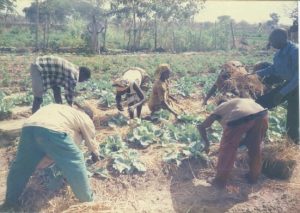GHANA IPM PROGRAMME: PAST, PRESENT AND FUTURE
Recent developments have shown that Integrated Pest Management (IPM) could be more practical and field oriented to the benefits of the ordinary farmer. The authors have personally come to accept the fact that promoting IPM is also about empowering users to engage in competitive and sustainable agricultural and horticultural production with long-term positive impacts on hunger and environmental health. The Farmers’ Field School (FFS) training methodology which we embraced in Ghana in 1995, originated from the FAO Intercountry programme in Asia where it had been used to train over one million rice farmers in integrated pest management strategies. The FFS is an emerging extension tool for promoting integrated pest management, because of the growing realization that future agricultural growth for resource-poor farmers should be knowledge intensive to be able to deal with complex environments with varied characteristics often specific to a particular location.
The IPM/FFS training distinguishes itself from conventional IPM extension packages by its participatory and farmer centred approach. Farmers gain fundamental understanding of the agro ecosystem and economy of their crops on which they base their own crop management decisions.
In Ghana, it was discovered that more than 80% of farmers trained during the first IPM/FFS programme under the FAO Technical Co-operation Programme (TCP) funded pilot project in rice production conducted in five irrigated sites in Ghana (Dawhenya, Tono, Botanga, Vea and Afife) changed their practices and adopted the IPM strategies. During the scaling up programme funded by UNDP through the FAO, an impact assessment study observed that with FFS, crop yields rose by a mean of 150% whilst losses dropped from 46% to 10% while production costs fell by about 40-58%. In a number of communities, farmers formed groups after completing FFS training. These groups of FFS graduates met and discussed issues together. They also demonstrated IPM to other farmers who did not participate in a FFS. The results of these training activities convinced the relevant Government authorities at the time that the IPM/FFS had the potential to complement the extension delivery in the country. Thus, Government directed that it should be scaled up to cover other crops and made available to larger group of farmers. For this reason, a National workshop was held in Accra in December 1999, with the following objectives:
- Review the achievements of the IPM/FFS;
- Develop strategies for creating awareness within the relevant agencies and communities; and
- Examine the potential of the IPM/FFS training for overall agricultural and rural development in Ghana.
A general observation made during the workshop was that, in view of the multidisciplinary nature of the subjects covered in the IPM/FFSs, it was felt more appropriate to adopt the name Integrated Crop and Pest Management Farmers? Field School (ICPM/FFS). Furthermore, taking note of the fact that the FFS was an extension methodology, the workshop recommended that the ICPM/FFS training methodology should be extended to cover other activities in the Ministry of Food and Agriculture including livestock. A policy framework was to be put in place to ensure that the establishment and implementation of the training methodology was harmonised with other agricultural extension activities. Subsequently, the ICPM/FFS was progressively applied to Ghana?s agriculture and there was a great input in training farmers in target districts of the UNDP/FAO?s funded National Poverty Reduction Programme (NPRP) in Ghana.
By the end of the NPRP, well-established and tested guidelines for developing methodologies and curricula for FFS trainings had emerged. The following crops had been handled: rice, cassava, cowpea, plantain and vegetables. The number of extension agents including village worker NGOs trained as ICPM/FFS facilitators in Ghana came to two hundred, and two thousand four hundred farmers trained in healthy production of rice (1085), vegetables (824) and plantain (261). Two case studies about cabbage production at Weija Irrigation Scheme and Managing of plantain weevils and nematodes showed that with ICPM/FFS practices farmers were able to produce cabbage and plantain in a cost effective, highly profitable and environmentally sound manner with less use of pesticides.
This is an abstract of the full article published in: Outlooks on Pest Management – February 2014 issue.
The full text of this article is available to subscribers of Outlooks on Pest Management.
Non-subcribers may buy & download fulltext article.
Authors: K.Afreh-Nuamah and C.Akotsen-Mensah, Forest and Horticultural Crops Research Centre, Kade, College of Basic and Applied Sciences, University of Ghana, Legon.
Category: Agriculture











